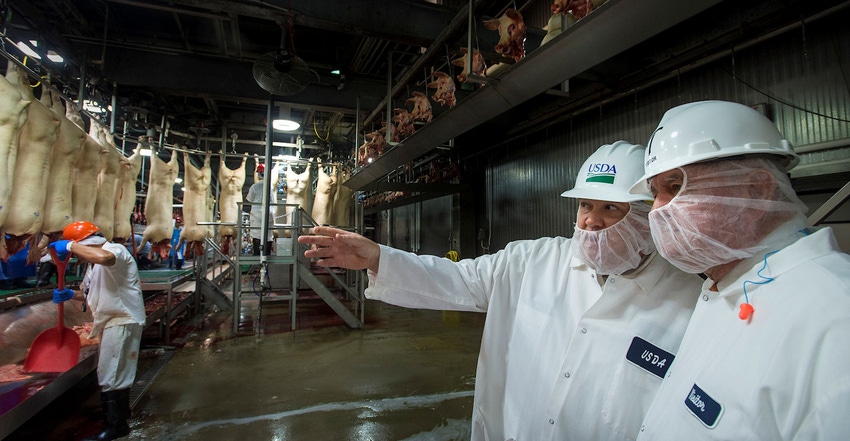Inspectors being asked to work without pay affecting morale, and no surprise inspections seen.

The Food & Drug Administration oversees inspections of nearly 75% of the nation’s food supply, and nearly all of FDA’s inspectors remain furloughed during the current government shutdown.
The U.S. Department of Agriculture’s Food Safety & Inspection Service (FSIS) also remains hamstringed in its ability to carry out inspections, as inspectors are not receiving pay for their work.
The government shutdown comes at a time when many inspectors were already being asked to do more due to inspector shortages, and it is also creating morale problems and putting food safety at risk, Rep. Rosa DeLauro (D., Conn.) said. DeLauro held a House Congressional Food Safety Caucus briefing on Wednesday afternoon.
“FDA inspectors are still working without pay, and they are only able to carry out one-third of regular inspections. FDA also remains understaffed for food surveillance and food recall operations, and enforcement appears to be down,” she said. “At the same time, the status of FDA’s work finalizing guidance and implementing rules related to the Food Safety Modernization Act remains uncertain.”
Sarah Sorscher, deputy director of regulatory affairs at the Center for Science in the Public Interest, said at the House briefing that the most significant impact is on long-term morale. Base pay for many of the USDA inspectors starts at $29,000 per year, leaving little financial cushion. As of Jan. 11, USDA and FDA food safety inspectors have all now missed a paycheck. The reality is setting in that they have expenses that they may not be able to cover, and that stress may bleed over into their work.
“We haven’t seen widespread evidence of people not showing up to work, but it would be a huge and immediate impact if it was,” Sorscher said.
“USDA inspectors work in the some of the most inhospitable work environments around,” said Tony Corbo, senior lobbyist at Food & Water Watch. “They are exposed to animal diseases and caustic antimicrobial chemicals, and in many plants, they are understaffed. The shutdown is making staffing problems worse. Already, we hear that some inspectors are having a difficult time scraping enough money to put gas in their cars to get to work during the shutdown. The situation is becoming untenable.”
FDA claims that it will continue to conduct “for cause” inspections and pursue criminal and civil investigations related to “imminent threats to human health or life.” The agency has posted no new warning letters since the shutdown began more than two weeks ago. “That raises concerns that enforcement activities effectively may have stopped,” Sorscher had said in a previous statement.
Corbo said there were already staffing shortages before the shutdown started. FSIS requires a certain number of inspectors for each carcass slaughtered. In fiscal 2018, FSIS oversaw the slaughter of 171 million livestock animals, 9.5 million poultry birds and an estimated 4.4 billion lb. of imported meat and poultry.
A poultry plant, for instance, allows for up to 140 birds to be slaughtered per minute, with four inspectors assigned to that line. If one of the inspectors isn’t on the line, that line has to be slowed down.
“The longer the shutdown continues to drag on, the more dangerous the situation becomes,” said Thomas Gremillion, director of food policy at the Consumer Federation of America. “Consumers deserve better assurance than this that their food is being kept safe.”
“We are coming out of a year that full of high-profile outbreaks of foodborne illness. The FDA should be focused right now on finding solutions to make our food safer,” Sorscher said. “Instead, they’re scrambling just to staff basic inspection duties, making consumers even less confident in our food system.”
Colorado breweries shut down
Sen. Michael Bennet (D., Colo.) called on Treasury Secretary Steve Mnuchin to address the government shutdown’s effect on brewers and distillers as they await approvals, delay product launches and halt projected growth.
“The uncertainty of a government shutdown is affecting these business owners’ ability to invest, hire, grow and hit revenue targets,” Bennet wrote in a letter to Mnuchin. “The inability of these companies to plan also affects farmers, suppliers and everyone along the craft brewing supply chain -- an industry that contributes $76.2 billion and more than 500,000 jobs to the U.S. economy.”
Due to the partial government shutdown, the Alcohol & Tobacco Tax & Trade Bureau has been unable to review or approve any labeling changes, new formulae or permits for brewers and distillers across the country. Since the start of the shutdown, more than 11,000 applications for alcohol labels have been backlogged.
“If the shutdown worsens an already lengthy approval backlog, brewing companies could suffer delays and tens of thousands of dollars of lost revenue,” Bennet wrote.
Colorado is home to nearly 400 breweries.
About the Author(s)
You May Also Like




.png?width=300&auto=webp&quality=80&disable=upscale)
